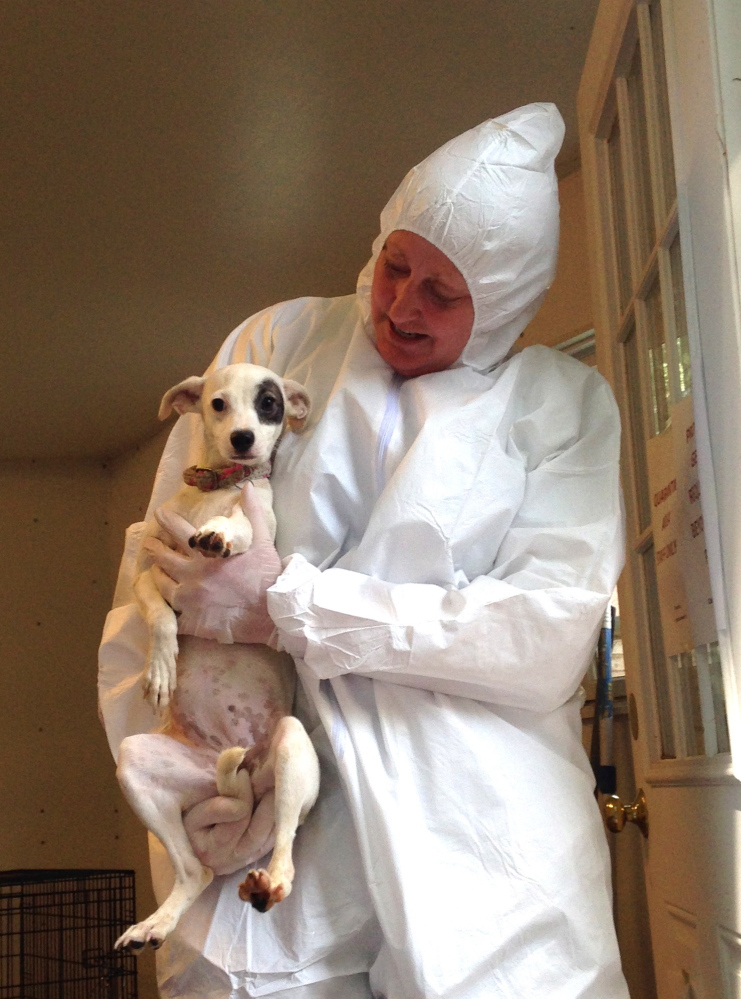The state has placed the midcoast’s largest animal shelter under quarantine after five puppies rescued from a shelter in Alabama tested positive for ringworm.
The disease is contagious and can be spread to humans by touching an infected animal or by touching infected objects, but health experts say it is treatable.
Dr. Michele Walsh, the state veterinarian, said the quarantine at the Coastal Humane Society in Brunswick was imposed Friday by the State of Maine Animal Welfare Program.
The quarantine will remain in effect for about a month, or until the shelter can demonstrate that the outbreak has been controlled, Walsh said.
During the quarantine, no stray animals or abandoned pets can be brought to the shelter, and animals currently at the shelter on Range Road cannot be adopted. About 220 animals are currently sheltered at the Coastal Humane Society facility, with another 100 or so animals living in foster homes. Coastal Humane Society’s administrative offices on Pleasant Street are not affected by the quarantine.
“It’s all about how they manage it,” Walsh said when asked how long the quarantine might last at the shelter, which has contracts to accept animals from 12 midcoast communities.
She said ringworm is a treatable fungal infection similar to athlete’s foot. It is not uncommon in animal shelters, where animals with weakened immune systems – such as puppies or kittens – are more susceptible to contracting the disease. Symptoms include flaky or itchy areas of skin that spread outward.
Ringworm is a skin and scalp disease caused by fungi. It gets its name from the characteristic ring-like rash on the skin. Many species of animals can transmit ringworm to people, including dogs and cats, cows, goats, pigs and horses. Puppies and kittens most often display patches that are hairless, circular or irregular shaped areas of scaling, crusting and redness that may or may not be itchy, according to the U.S. Centers for Disease Control and Prevention.
Dr. Mandie Wehr, a veterinarian and director of shelter operations at Coastal Humane Society, said the five infected puppies arrived in Brunswick on July 18 as part of the $100,000 Challenge sponsored by the American Society for the Prevention of Cruelty to Animals and Rachael Ray, the host of a syndicated food talk show.
Fifty animal shelters from across the United States compete during June, July and August to break their own records for saving the lives of animals.
Wehr said the puppies were scheduled to be euthanized at an overcrowded shelter in Alabama. When the puppies arrived in Brunswick, they were segregated from the rest of the animals. When they started to show symptoms of ringworm, their blood was tested and the results came back positive.
The puppies have been placed in isolation in a building separate from the main complex. Shelter workers feed and check on the dogs while wearing protective gloves, boots and clothing to prevent contamination. Meanwhile, no animals can leave or enter the main shelter.
Mary Fifield, interim executive director of the Coastal Humane Society, said her staff has taken extra precautions to prevent the spread of the disease beyond the five quarantined puppies.
Fifield has found two places in Brunswick that have indicated they would be willing to accept strays that are found by animal control officers who bring animals to the shelter.
Fifield said managing the outbreak is going to be costly. The nonprofit is accepting financial donations as well as supplies. For more information on how to help out, call 449-1366, ext. 4, or go to coastalhumanesociety.org.
The Coastal Humane Society was founded in 1950 by a Bowdoin College professor of English, Stanley Chase. It is one of the largest shelters in Maine with a staff of 20 people and over 100 volunteers.
Send questions/comments to the editors.




Success. Please wait for the page to reload. If the page does not reload within 5 seconds, please refresh the page.
Enter your email and password to access comments.
Hi, to comment on stories you must . This profile is in addition to your subscription and website login.
Already have a commenting profile? .
Invalid username/password.
Please check your email to confirm and complete your registration.
Only subscribers are eligible to post comments. Please subscribe or login first for digital access. Here’s why.
Use the form below to reset your password. When you've submitted your account email, we will send an email with a reset code.